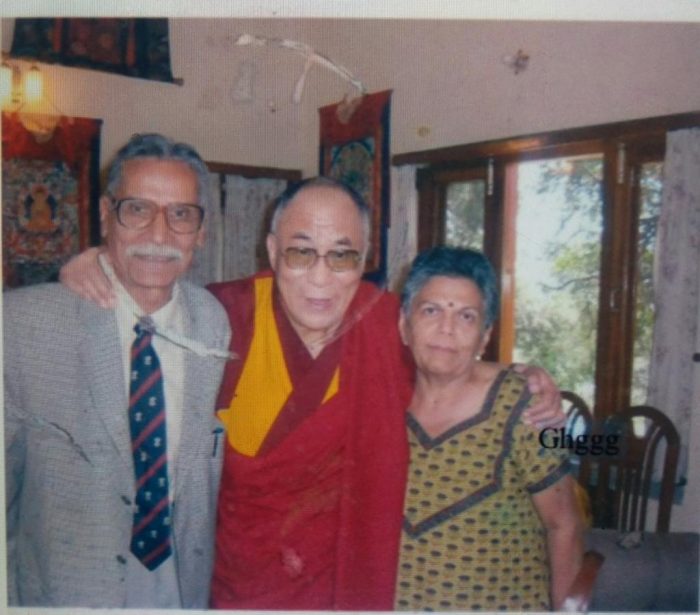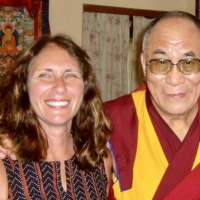Dharamsala, home of the exiled Dalai Lama, was nothing like I had pictured. Crowded and commercial, it was more like a third world tourist mecca than the magical Lhasa I had imagined. But that didn’t matter‚ I was about to meet His Holiness, the Dalai Lama, in a private audience arranged by my newly adopted Indian family. We were a motley eleven, grandparents, children, grandchildren, my son, and myself, all huddled in a drab waiting room in the Dalai Lama’s compound, each lost in our own web of nervous anticipation for what was to come. My personal reverie went back to that world-changing day four years earlier that brought me to this extraordinary moment.
It was September 11, the day Americans experienced just how vulnerable the rest of the world had always been. We were no longer insulated from hostile aggression; we had been attacked in our own front yard. My son, Devin, was a freshman at Washington College. He had chosen to live at the university’s International House, finding the array of foreigners far more fun and interesting than the usual dorm/frat house fare. The residents of this eclectic dorm were from all over the world and from all cultures; many were Muslim. After only two weeks of carefree acclimation, settling into their dreams of an American college experience, their lives, like the rest of ours, were turned upside down. Away from home, their families, and everything else familiar, the international students were particularly distraught. The next day, feeling like most of us, so very feckless, my “mom” instincts kicked in, I baked some sweets, loaded them into my minivan, and, with my own trepidation, drove, through the endless Eastern Shore cornfields to Chestertown, Md to comfort my anxious son and anyone else who needed some maternal TLC.
Since orientation, Devin had been telling me about one particular dorm mate from New Delhi, Ambika. He was intrigued with her exotic poise and directness, and I looked forward to meeting her. She stood out that mind-numbing day, so pretty, and with her self-assured, nonplussed, demeanor, she caught my attention. I thought to myself‚ this girl comes from interesting lineage; she has been, and will go places. My rambling Victorian farmhouse on the Chesapeake Bay was often second home to a diverse array of international characters; the teenage Mexican savant muralist, the wacky Canadian traveling drama troupe, the Norwegian exchange student with nothing to exchange, the diminutive Japanese coed who thought Alabama was the heart of the nation, the spirited Toltec shaman, the seductive Russian scam artist, and now a “Brahmin princess.” Ambika was an instant fit‚ charming, articulate, fiercely opinionated. She quickly became a treasured part of our family, and a frequent guest for Thanksgiving, Christmas and all those lazy weekends when she and Devin just wanted to be at home.
On many of these visits, Ambika would regale me with riveting stories of her celebrated grandparents, KC and Sudha. KC was a career Indian Civil Servant who followed a path less traveled. While most sought glamorous postings in places like Paris or Washington, they preferred to work in outlying states and countries, including Tibet and Afghanistan. Aside from their ever-changing official duties, their personal mission had always been to represent local governments by respectfully introducing modern culture and offering compassionate protection. Ambika’s “Nana” KC’s persistent integrity was a source of both pride and sometimes chagrin to his beloved India; her “Nani” Sudha’s sense of familial duty, adventure and religious devotion were inspirational to all. Sophomore year, we mourned the loss of Bala, Ambika’s beloved dad, to a sudden stroke. In Devin and Ambika’s junior year, we led a madcap adventure, into Mexico. When her lovely mother Geeta first visited, the two moms hit it off immediately. With each visit thereafter, it became increasingly clear to all of us that we had become a blended family.
As graduation drew near, I overheard Ambika telling Devin that her graduation gift from her grandparents was a trip to wherever she chose, and she could bring Devin along as her guest. Never one to miss out on an adventure, I prompted, “I want to go” to which she replied, “Yes, of course, and my mother will come too—this will be a family event.” Remembering my favorite stories of her grandparents’ posting in Tibet during the period of the Dalai Lama’s exile, I expressed my reverence for His Holiness, to which Ambika promptly announced, “Then you shall meet him.” I, of course, thought her delusional. But the following week, I received an email from her grandfather requesting my passport number, as a private audience with His Holiness had been arranged. Of course, Geeta returned to Maryland for graduation. Together we planned and hosted a celebratory party with an Indian food theme. We collaborated in the kitchen, creating the most savory Indian delicacies, samosas, curries, homemade paneer, complemented with my specialty, pastries and cakes.
The very next day, the four of us were off to Delhi on the trip that would change my life forever. KC and Sudha were waiting up for us, irrepressibly proud and happy to see their new college graduate granddaughter, whom they had lovingly nicknamed Sunshine. I was instantly bowled over by KC’s intense frenetic energy; it was and is dumbfounding. Sudha’s tranquil presence was just as I had imagined. The familial attraction I had experienced meeting Geeta was magnified. I felt truly at home in this strange house halfway around the world. I barely had time to adjust to jet lag and the extreme May heat, when two days later found myself, an integral part of this humble, joyous family, traveling in a second-class train compartment to the base of the Himalayas where we were met by His Holiness’ personal drivers. After a frightening three-hour ride up a treacherous mountain road through steep switchbacks, without a railing in sight, we found ourselves in Dharamsala, a bustling mountain city and home to the Tibetan government in exile. On the ride we broached the idea that someone should write a book about Sudha and KC’s adventurous lives. The following morning, before our audience with the Dalai Lama, we first toured the Tibetan Medicine Museum, Men-Tsee-Khang, a virtual pharmacy resplendent with all the aromatic healing herbs, plants and minerals used in Tibetan Medicine. From there we visited the Tsuglagkhang complex, home to the Tsuglagkhang, the largest Tibetan temple located outside Tibet. Inside was a huge meditation hall covered in colorful thankas, and beautiful, ornate murals. In the garden, I was delighted to witness the much-heralded spectacle of the resident monks embroiled in one of their lively debates. And lastly we visited the Tibet Museum, dedicated to documenting the Chinese incursion in Tibet. As I was wandering through the exhibits, across the room, I spied Sudha, decked out in her most elegant silk salwar kameez, bending over an antique mahogany glass case. I crossed the room and found her tearfully staring at the contents: charred, yet intact, ancient scrolls. A number of complex emotions washed over her face. Responding to my concern, she said, “Susan, I cannot be sure, but it’s possible I brought some of these items out of Tibet.” I was honored to share this poignant moment with her and curious to hear the rest of the story.
From there, we were whisked off to the Dalai Lama’s compound, and walked through the tall, heavy gates. We entered through another door into a bustling antechamber where we were patted down and our bags searched at the security check. A guard escorted us to the drab reception area where I now found myself about to meet my spiritual icon‚ and it was positively surreal. Just then, as naturally as could be, the Dalai Lama walked in with all his beatific presence, embraced KC and Sudha, and bowed his welcome to the rest of us, before ushering us down the hall to another, very unceremonious, meeting room, decorated with a few random thankas and Tibetan mandalas. I was so overwhelmed with the present moment, my memory is hazy. I do remember the conversation between them was in English‚ very warm and familiar, like three estranged friends catching up. They reminisced about the tumultuous catastrophe that engulfed Tibet. His Holiness was curious about specific events and people left behind following his exile. KC had been there, in Yatung, helping beleaguered Tibetans in his official capacity as Trade Representative and what modest assistance had been extended him from the Home Office in New Delhi. In an exuberant style particularly his own, KC eagerly provided many of the missing pieces. It struck me funny that I was in a room with the Dalai Lama, and it was KC, with his larger than life presence, who dominated the hour. This social anomaly didn’t escape His Holiness’ personal assistant, who sat giggling in the corner. Near the end of the hour, the Dalai Lama exclaimed, “You must write a book! The story must be told. When I say anything, the Chinese dispute it!” Ambika shared our plan to write a book from her grandmother’s perspective and asked for his blessing. With a humorous impatience quite his own, he said, “The book is blessed! Just write the book.” In this strange way, the energies for this book seemed to come together in the course of one Himalayan morning.
Now, I never considered myself an author, or even an interviewer, but I did not take the words of the Dalai Lama lightly. And seeing that no one else was stepping up, the following fall, I returned to New Delhi with a loose outline, a cheap Radio Shack voice recorder, and a video camera, that I didn’t know how to use, intent on creating an outline. Working in the chaos of the Johorey household proved to be a real challenge. Sudha is the heart of the busy home, and the constant distractions forced us to go off on mini writing retreats. I revisited four times. On each visit, Sudha and I would head off into the Himalayas to reminisce, write, and record. Over the next ten years, I compiled all the rough data, re-interviewed for missing details, researched, edited and winnowed eventually resulting in bringing Sudha’s captivating story to life in the book “Toppled World”. Sharing her fascinating life has been my mission and thanks to her amazing humility, grace, and humor, one of the great joys of my life.












Read 2 comments and reply